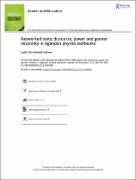| dc.description.abstract | Research within science textbooks has dominantly focused on examining explicit representations of women and men using quantitative methodology. The assumption that gendered arrangements are necessarily explicit and therefore visible and countable, overlooks how power works explicitly and implicitly through discourse to produce specific gendered subjectivities. In taking up feminist post-structuralisms, this study contributes to textbook studies within sciences by illuminating both explicit and implicit representations of gender. Using discourse analysis, ‘gender-neutral’ and/or disembodied subjects and objects were ‘unmasked,’ revealing a generic male and/or masculine subject. Gender-neutrality, which is pervasive within the physics textbooks, was thus exposed as a mask for generic maleness/masculinity. I argue that this objectivist science, which remains compatible with a narrow range of student gendered identities, forecloses possibilities for a wide range of scientist subjectivities, to produce a more inclusive physics curriculum, with a greater possibility of developing physics using diverse subjectivities. | en_US |


